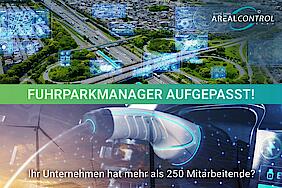With the CSRD, existing rules for non-financial reporting are significantly expanded. In addition to all companies listed on an EU-regulated market (with the exception of micro-enterprises), all non-capital market-oriented companies are also affected by the reporting obligation if they meet two of the following three criteria:
- More than 250 employees
- Net turnover of more than 40 million euros
- Balance sheet total of more than 20 million euros
It is estimated that around 50,000 companies in Germany will be affected, around 38,000 more than before. In the European Union approximately 600.000. According to the current schedule, the CSR guideline is to apply from January 1, 2024 for the 2023 financial year.
Among other things, the directive obliges the companies concerned to report the emissions they put into circulation as a result of operational mobility. This primarily includes commuter mobility, business trips, leased vehicles and the company's own vehicle fleet. If a company does not have its own database, statistical values are assumed that can be based on a high proportion of fuel-powered individual vehicles, which is noticeable for the company in the form of a high CO2 sales price. This new sustainability reporting obligation therefore poses major challenges for companies; on this point especially the fleet managers. They are already intensively involved in the analysis of the switch from combustion engines to electric vehicles. An in-depth data analysis using telematics data can provide direct answers to the questions of which vehicles have to go, where charging stations need to go, and when which vehicle type should be ordered.
The extended sustainability reporting obligation, which now covers the entire spectrum of sustainability issues (environment, social and governance), is intended to appeal to internal and external stakeholders, such as e.g. B. Offer customers, suppliers, employees and investors greater transparency and a more reliable basis for decision-making and strengthen trust in the company. Thus, the non-financial statements of a company and its key figures will become more and more important, because customer relationships, awarding of contracts and investment intentions will be even more dependent on these key figures in the future.
Shaping instead of managing: The new role of the fleet manager
Affected companies are therefore well advised to adapt to the new requirements of the sustainability directive today and to reduce CO2 emissions in all areas of the company in the long term. Above all, the operational mobility of the company and its employees is the focus of these considerations - and with it the fleet manager. Even if, due to the strong emission and cost pressure, operational mobility will develop away from isolated offers towards networked, holistic offers in the company, the vehicle fleet will remain an important part of companies and will be included in the reports to be created. However, since alternative mobility solutions, such as e.g. For example, if shared mobility, car subscriptions and digital mobility budgets are increasingly finding their way into companies, the role of the fleet manager is also changing towards mobility manager. This position offers exciting perspectives and a lot of creative freedom for the future of operational mobility. Intelligent telematics with booking of the pool vehicles via app, optional corporate car sharing via "plug 'n play" open up completely new possibilities.
Telematics supports the mobility manager in fulfilling the CSR guideline
In order to be able to successfully master the challenges in mobility management and to create the required basis for determining the emissions put into circulation, the fleet or mobility manager needs transparency and reliable data. Telematics solutions support him in fulfilling the CRS directive by supplying the necessary data at the push of a button.
Fleet management software supports the fleet manager in his increasingly complex everyday life. For example, the vital data of the fleet, optionally paths and routes for the electronic logbook can be recorded via telematics systems, and the use or load, driving behavior and fuel consumption can be analyzed and evaluated. The determined data can then be used to optimize work processes. The purpose of fleet software is to increase process and cost efficiency in the fleet.
Arealcontrol telematics improve fleet performance, save on fuel costs, support driver performance and improve overall fleet efficiency thanks to comprehensive data transparency. – Incidentally, it also provides the basis for reporting in accordance with the CRS directive.
Let us advise you!
